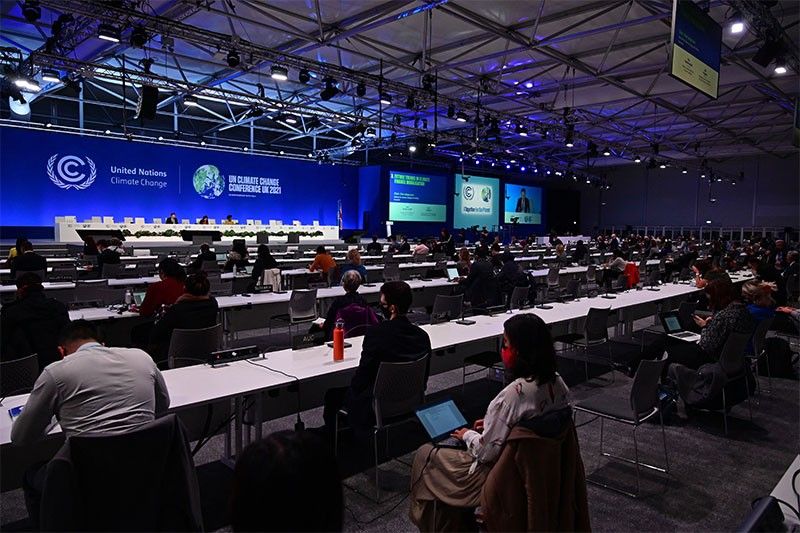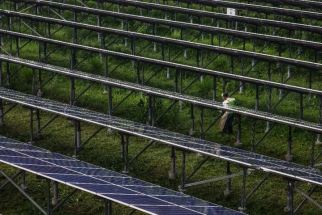Chasm opens between COP26 words and climate action

GLASGOW, United Kingdom — COP26's first week saw keynote pledges to end deforestation, phase out coal, and mobilise trillions for green investment. But observers say there is a gulf between host Britain's proclamations and the emissions cuts that must be achieved.
Mohamed Adow, director of the Nairobi-based climate think tank Power Shift Africa, told AFP that there had been "two realities" at the global climate conference in Glasgow.
"One is the world of press releases by the UK Government announcing a host of initiatives such as 'an end to coal', which suggest all is well and we've as good as cracked the climate crisis," he said.
"The other reality is outside this PR bubble. The climate deals in cold hard facts."
The conference aims to implement the Paris Agreement — including the goal of limiting temperature rises to between 1.5 and 2 degrees Celsius above pre-industrial levels.
British organisers are pushing to solidify 1.5C as the summit's unequivocal temperature target.
They have also pushed for their much-repeated priorities — "coal, cars, cash and trees" — shorthand for actions to phase out polluting fuels and internal combustion vehicles, provide money to help the world decarbonise, and protect forests.
There was movement toward that end at COP26 this week.
A COP26 spokesman said there had been "real momentum for climate action" including "commitments on ending our reliance on coal, increasing climate finance, tackling deforestation and plans to cut emissions."
But experts say there is actually a glaring disconnect between what some called "inflated, rehashed pledges" and genuine progress on reducing fossil fuel emissions.
End of coal?
On Wednesday, for instance, COP26 president Alok Sharma announced: "A 190-strong coalition has today agreed to phase out coal power".
Business Secretary Kwasi Kwarteng tweeted: "The end of coal is in sight."
The 190 figure was given to the media under embargo on Tuesday night, but a list of signatories was not released until the following day.
It contained only 77 new signatories, including 46 countries, on top of others that had already signed on to a previous alliance to end coal.
Out of these, COP26 organisers said 23 countries had issued new pledges to phase out coal during the summit, including major users South Korea and Vietnam.
But in the list of countries with new commitments obtained by AFP, 10 nations use no coal at all in their energy mix, according to data from the Ember climate think tank.
All told, national signatories to the COP26 coal pledge account for around 13 percent of global output.
Unprecedented?
On Monday, Downing Street said that countries representing 85 percent of global rainforests had signed an "unprecedented" pledge to end deforestation by 2030.
But it was similar to the 2014 New York Declaration on Forests, signed by 40 countries and more than 150 organisations and indigenous groups, to strive to end deforestation, also by 2030.
An assessment this year on the declaration's progress found that out of the 32 biggest forest nations, only India had translated the pledge into concrete action.
Damian Fleming, deputy lead at WWF's Global Forest Practice, said the COP26 deforestation pledge was "unprecedented in scale... but not in ambition."
"We have been here before. Yet since (the New York declaration) a forested area greater than the size of France has been deforested," he said.
"The pledges are coming fast and furious. But they all seem to be just business-as-usual wearing a green cloak of trees," Doreen Stabinsky, Professor of Global Environmental Politics at the College of the Atlantic, told AFP.
"There aren't enough trees on the planet to just keep blindly carrying on emitting."
How much?
Finance is a crunch issue at COP26, with developing nations demanding rich emitters make good on decade-old promises to provide $100 billion a year to help them cope.
That figure is a drop in the ocean compared to the estimated $4 trillion needed annually to decarbonise the economy by 2050.
On Wednesday, former Bank of England governor Mark Carney said that a net-zero alliance made up of hundreds of lenders with assets totalling $130 trillion on their collective portfolios was ready to help the global transition to carbon neutrality.
"The money is here if the world wants to use it," said Carney.
But observers noted that fund investors only needed to allocate a small percentage of capital to green projects to qualify as net-zero lenders, nor were they restricted from investing in fossil fuels.
That means only a fraction of the $130 trillion actually goes to green projects.
'Pinch of salt'
Experts say an accord by more than 100 nations to slash methane emissions by 30 percent by 2030 could have a real impact on short-term heating.
And India, the fourth biggest emitter, announced its intention to ramp up renewables and reach net-zero by 2070.
International Energy Agency head Fatih Birol said this week that the pledges announced at COP26 — if fully implemented — could see warming limited to 1.8C.
He stressed however that this required "governments to turn their pledges into clear and credible policy actions and strategies today".
British sources are already trailing the 1.8C figure as a possible COP26 achievement.
But scientists say it is based on vague net-zero plans with few or no short-term emissions targets.
A senior diplomat told AFP that "most of the net-zero pledges are void of content".
Countries such as Australia and Saudi Arabia announced net-zero goals with "no plans to implement them and emissions going massively in the wrong direction," Simon Lewis, professor of global change science at University College London and the University of Leeds, told AFP.
"It's logical to take all pledges and convert them into a best estimate," he said.
"But you've got to take it with a huge pinch of salt and an enormous banner saying: Warning! This is unlikely to happen."
The UN says that the latest round of net-zero commitments will see emissions rise 13.7 percent by 2030. To be 1.5C compliant, they must fall 45 percent by then.
Daniel Willis, from Global Justice Now, said COP26 had "failed to adequately address the climate crisis".
He said the summit had instead produced "inflated reporting of financial sums, rehashed spending pledges spun as new, and bizarre claims that leaders have managed to limit warming to 1.8C based only on pledges without action."
Bookmark this page for updates on the United Nations climate summit, known as COP26. Photo courtesy of AFP/Tolga Akmen
Singapore announces it aims to achieve carbon neutrality by 2050, giving a firm date for the first time, and will look at using hydrogen as a major power source.
The city-state targets for carbon emissions to peak in 2030 at 60 million tonnes, a reduction of five million tonnes from the previous goal, Deputy Prime Minister Lawrence Wong said.
The Southeast Asian nation also has plans to look at developing low carbon hydrogen as a major power supply in the long term. — AFP
Australia will present a more ambitious UN emissions target "very soon" and is bidding to co-host a COP summit with Pacific island neighbours, Foreign Minister Penny Wong said Thursday, signalling a ground shift in climate policy.
During a first solo overseas visit since her centre-left government was sworn in, Wong admitted that on the climate, "Australia has neglected its responsibility" under past administrations.
She told hosts in Fiji's capital Suva that there would be no more "disrespecting" Pacific nations or "ignoring" their calls to act on climate change.
"We were elected on a platform of reducing emissions by 43 percent by 2030 and reaching net-zero by 2050," Wong said. — AFP
Countries have proposed to hold an extra biodiversity meeting in Nairobi in June as talks in Geneva tasked with saving nature entered their final day Tuesday without an agreement.
In a document uploaded on the conference website, dated Monday, countries suggest holding a new meeting in the Kenyan capital between June 21 and 26 to "continue negotiations" on the document and other issues.
The decision is subject to official approval by the Geneva meeting before it wraps up later Tuesday. — AFP
British Prime Minister Boris Johnson on Sunday hails a global accord to speed up action against climate change as "truly historic" and "the beginning of the end for coal power".
But he says his "delight at this progress" at the UN COP26 summit in Glasgow was "tinged with disappointment" because of a failure to secure the agreement of all countries to phase out hydrocarbons.
"Those for whom climate change is already a matter of life and death, who can only stand by as their islands are submerged, their farmland turned to desert, their homes battered by storms, they demanded a high level of ambition from this summit," says Johnson. — AFP
A UN climate summit text on Saturday urges nations to accelerate the phase-out of unfiltered coal and "inefficient" fossil fuel subsidies, after large emitters tried to remove the mention of polluting fuels.
The text, which comes after two weeks of frantic negotiations at the COP26 summit in Glasgow, omitted any reference to specific finance for "loss and damage" -- the mounting cost of global heating so far -- which has been a key demand of poorer nations.
The mention on Saturday of fossil fuels was weaker than a previous draft, which called on countries to "accelerate the phasing out of coal and subsidies for fossil fuels". — AFP
- Latest


























